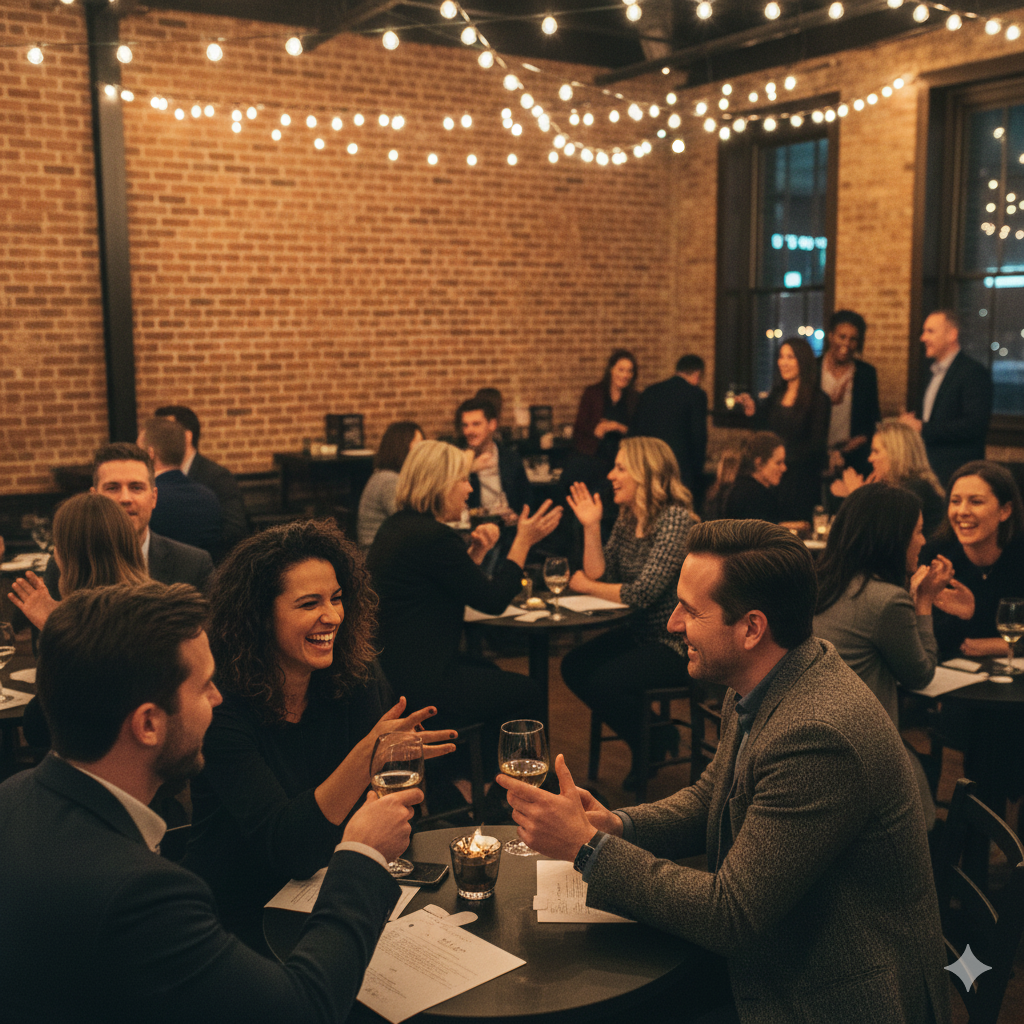Time to unlearn.
Rule 1: The Person Who Listens More Wins
Every instinct tells you to fill those three minutes with your best material. Your job, your travels, your hobbies, your charm. Wrong move.

The Counterintuitive Data
Research from Harvard’s Social Cognition Lab found that people who ask more questions in conversations are rated as significantly more likable than those who share more information. According to Harvard Business Review’s analysis of conversational dynamics, this effect is so strong that question-askers were consistently preferred as future interaction partners—regardless of their actual qualifications or accomplishments.
The mechanism is elegant: when you ask questions, you signal interest. When you listen to answers, you create intimacy. When you remember details and ask follow-ups, you demonstrate the kind of attention that relationships require. Your conversation partner leaves feeling seen, which they’ll later describe as “chemistry.”
The Practical Application
Aim for a 60/40 split—them talking 60% of the time. Ask open-ended questions that can’t be answered in one word. “What’s keeping you busy lately?” beats “What do you do?” because it invites story rather than résumé. When they answer, resist the urge to relate it back to yourself. Instead, go deeper: “What got you into that?” or “What’s the hardest part?” The bell will ring and they’ll realize they talked about themselves the entire time—and loved every minute.
Rule 2: Vulnerability Outperforms Confidence
The standard advice: project confidence. Stand tall, speak clearly, own your accomplishments. This creates a polished surface that actually repels connection.
The Research Behind the Reversal
Brené Brown’s work on vulnerability has infiltrated corporate culture, but the dating implications remain underexplored. The Atlantic’s examination of vulnerability and attraction synthesized multiple studies showing that strategic self-disclosure of struggles or imperfections creates stronger connection than curated presentation of strengths. The effect is particularly pronounced in brief encounters where authenticity is otherwise difficult to assess.
This doesn’t mean trauma-dumping. It means admitting you’re nervous, acknowledging when you don’t know something, or sharing a small failure alongside your wins. The confidence paradox: admitting imperfection requires more security than performing flawlessness.
The Practical Application
One honest moment per conversation. “I’m always a little nervous at these things” works. “I tried to learn Italian last year and failed spectacularly” works. “I have no idea what I want to do next, which is terrifying and exciting” works. These admissions give others permission to be human too, which is exactly what intimacy requires.
Rule 3: Memorable Beats Impressive
You’ve accomplished things. You have credentials, experiences, stories that demonstrate value. The temptation is to deploy them. Resist.

The Memory Science
Cognitive psychology distinguishes between semantic memory (facts) and episodic memory (experiences). People forget facts almost immediately but retain emotionally-tagged experiences indefinitely. Psychology Today’s memory research confirms that conversations generating emotional response—laughter, surprise, genuine curiosity—create lasting impressions, while conversations conveying impressive information fade within hours.
The professional who makes someone laugh will be remembered. The professional who recites accomplishments will blur into the twelve other professionals who did the same thing.
The Practical Application
Lead with stories, not stats. “I just got back from Tokyo” becomes “I accidentally ordered a dish in Tokyo that turned out to be raw chicken liver, and now I have a very specific fear.” The weird, specific, human details stick. Your job title doesn’t. If you’re worried about seeming unaccomplished, remember: they’ll Google you later. The credentials will be there. What won’t be Googleable is whether you made them feel something.
Rule 4: The Follow-Up Matters More Than the Event
Most people treat speed dating as the main event. Wrong frame. The event is the audition; the follow-up is the performance.
The Behavioral Economics
Scarcity and timing effects dominate post-event dynamics. Match too quickly or too eagerly, and you signal low value. Wait too long, and the emotional momentum dissipates. Research on optimal timing in social reciprocity suggests a window of 18-30 hours for initial contact—long enough to avoid seeming desperate, short enough to maintain connection.
The Practical Application
Message within 24 hours. Reference something specific from your conversation—not generic compliments, but actual content that proves you listened. Propose a concrete plan: specific venue, specific day, specific time. “Would love to continue our conversation about Japanese food disasters. Are you free Thursday evening? There’s a great izakaya in the West Village.” This specificity signals confidence and saves the tennis match of “when works for you” that kills momentum.
Rule 5: Rejection Is Data, Not Failure
The ego wants every match. The smart player wants the right matches.
The Reframe
Speed dating provides something apps cannot: rapid, in-person feedback on your presence and approach. Every non-match contains information. Were you talking too much? Coming on too strong? Playing it too safe? Instead of internalizing rejection as personal deficiency, treat it as market research. What’s working? What’s not? What signals are you sending that don’t match your intent?
The most successful speed dating veterans describe an iterative process: adjusting approach based on results, experimenting with different questions, calibrating energy levels. They detach outcome from identity, which paradoxically improves outcomes by reducing the desperation that repels connection.
The Practical Application
After each event, debrief yourself. Which conversations flowed? Which felt forced? What questions landed? What topics created energy? Track patterns across multiple events. The goal isn’t to become someone else—it’s to become a clearer, more effective version of yourself.
Rule 6: Energy Management Trumps Presentation
By round eight, everyone’s exhausted. The person who maintains genuine presence wins by default.
The Endurance Factor
Speed dating is a marathon disguised as a sprint. Twelve to fifteen conversations of three minutes each requires sustained social energy that most people deplete by halfway. The science of ego depletion suggests that self-presentation is cognitively expensive—maintaining a performed version of yourself burns resources fast. Elite events often run longer, amplifying this effect.
The Practical Application
Prepare physically: eat beforehand, limit alcohol, get rest the night before. Prepare mentally: accept that not every conversation will sparkle, and stop trying to force connections. The counterintuitive move is to conserve energy by being yourself rather than performing. Authenticity requires less fuel than curation. The final rounds—when everyone else is running on fumes—become your competitive advantage.
Rule 7: Play the Long Game
One event teaches you nothing. The circuit rewards persistence.
The Compound Effect

The probability of meeting a compatible partner at any single event is low. But probability compounds across events. Attend consistently and you’ll notice the same faces reappearing—people who, like you, are serious about the search. These repeated exposures build familiarity, which research consistently links to attraction. Someone who seemed neutral in round one becomes interesting by the third encounter.
Moreover, your reputation develops. Organizers notice consistent attendees. Other regulars begin to recognize you. The community aspect—especially in Hamptons circuits where the population is smaller—creates network effects that compound your visibility.
The Practical Application
Commit to at least three events before evaluating results. Treat each one as practice, not performance. The pressure of “this must work” creates the desperation that ensures it won’t. The relaxation of “I’m learning, and there’s always next month” creates the ease that attracts.
The Meta-Rule: Stop Optimizing
Here’s the paradox underlying all effective speed dating tips: the harder you try to make it work, the less likely it works. The desperation to impress creates the inauthenticity that repels. The fear of rejection creates the guardedness that prevents connection. The optimization mindset—treating each interaction as a conversion funnel—produces exactly the transactional energy that serious people avoid.
The new rules aren’t really rules. They’re permissions—to listen instead of perform, to be imperfect, to play long instead of forcing outcomes, to treat dating as something other than another domain to dominate.
The people finding partners aren’t gaming the system. They’ve stopped experiencing it as a system at all. They show up, stay curious, accept whatever happens, and try again next time. Simple, but not easy—especially for ambitious professionals who’ve optimized everything else in their lives.
Maybe dating is the one arena where letting go is the winning strategy.
For access to Social Life’s curated singles events in Manhattan and the Hamptons—designed for professionals who understand that the best connections can’t be forced—apply here. Bring curiosity. Leave the résumé at home.


